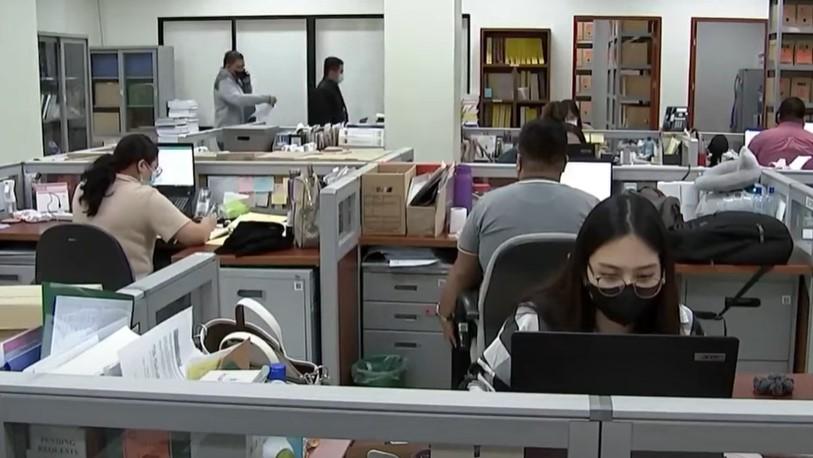How much will be the adjusted gov't workers' salaries under EO 64?

President Ferdinand "Bongbong" Marcos Jr. followed through with his promise to increase the salaries of government workers during his third State of the Nation Address (SONA).
In his report to the nation, Marcos said his administration has allocated funds for the salary adjustments of workers in the bureaucracy.
The Department of Budget and Management (DBM) announced that it earmarked P70 billion in the proposed national budget for 2025 to implement the first two tranches of the government workers' wage hike, covering the years 2024 and 2025.
To implement his administration's four-tranche (2024 to 2027) Salary Standardization initiative, Marcos issued Executive Order (EO) 64 on Aug. 2, 2024.
The salary adjustments cover civilian government personnel in the Executive, Legislative, and Judicial branches; constitutional commissions and other constitutional offices, as well workers in government-owned and -controlled corporations (GOCCs) and local government units (LGUs).
The last time wages of state workers were hiked was in 2023, when the fourth and last tranche of the scheduled salary adjustments under the Salary Standardization Law (SSL) of 2019 expired.
President Ferdinand Marcos Jr. has issued Executive Order No. 64, which adjusted the salaries of government workers.
— GMA Integrated News (@gmanews) August 3, 2024
How much will be the increase in salaries of government workers under the Marcos administration’s four-year salary standardization initiative?
Here are the… pic.twitter.com/PgrEGNFRwr
Now, under the new salary standardization initiative, how much would be the adjusted salary rates?
Based on EO 64, a typical government employee under Salary Grade 15, for example, could expect a maximum salary of P41,296 under the first tranche of wage adjustments this year.
This could be an increase of P1,929 from the current maximum rate (at P39,367) of a Salary Grade 15 employee under the last tranche of SSL 2019, which took effect on Jan. 1, 2023.
By Jan. 1, 2027, the fourth and last tranche of Marcos administration's salary standardization program, a typical Salary Grade 15 worker's maximum salary would go up to P47,172, an increment of P7,805 from the 2023 rates.
The EO 64 also shows the "step increments" in each salary grade, with their corresponding monetary values.
Under the government's Salary Standardization system, each salary grade represents the level of difficulty and responsibility of an employee's work. It consists of 33 salary grades.
Meanwhile, each of the Salary Grades from 1 to 32 have eight salary steps to determine the rate of salary depending on length of service in the position. Only the Salary Grade 33, the highest level, has two steps in the latest salary adjustment schedule.
The first step represents the minimum or the hiring rate for the position or Salary Grade, while the second to seventh steps are the intermediate rates.
The eighth step is the maximum salary rate.
Adjustment for personnel in LGUs
The EO 64 also provides that the salary adjustments for civilian personnel may be given to workers of LGUs subject to authorization from their respective "sanggunian" and compliance with personnel service limitation in the LGU's budget.
Nonetheless, the order-mandated ceilings as to the percentage rate of salary adjustments can be adopted by an LGU, depending on the class and financial capability.
For example, a special or first class city or province can adopt 100% of the adjusted rates under the EO.
Second-, third-, and fourth-class provinces and cities may adopt 95%, 90%, and 85% of the rates, respectively.
Budget Secretary Amenah Pangandaman
Retroactive
The EO 64 takes effect retroactively, which means that the first tranche of implementation will be effective on Jan. 1, 2024.
The President tasked the DBM to issue the guidelines necessary to implement specific provisions of the order.
Budget Secretary Amenah Pangandaman told GMA News Online that the DBM was already drafting the guidelines and was targeting to release it "hopefully within the month."
In a separate statement, Pangandaman said she already instructed the concerned DBM officials to swiftly complete the guidelines for the approved salary increase.
First round expected in 2024
"With this EO, we can now roll out the first tranche of SSL VI. We will rush the implementing guidelines so that government employees will see their first round of salary increases this 2024," she said.
Pangandaman said the computation for the first tranche of salary adjustments would be retroactive to Jan. 1, 2024, "so merong salary differential or back pay (so there would be salary differential or back pay)."
Sought for details, Pangandaman said the DBM will first finalize the guidelines, but raised the possibility that salary adjustments including the differential and back pay would be received by government workers at the "soonest" possible time.
Under the EO 64, the amount needed for the salary adjustment in 2024 shall be charged against any available appropriations under this year's General Appropriations Act, while the funding requirements for the adjustments scheduled in 2025, 2026, and 2027 will be included in the proposed annual National Expenditure Program (NEP) to be submitted to Congress, which will be the basis for a particular year's GAA.
"We can look forward to another round of salary increases with the implementation of the second tranche of SSL VI next year. The DBM has earmarked P70 billion under the FY 2025 MPBF (Miscellaneous Personnel Benefits Fund) to cover the additional cost requirements for both the first and second tranches of SSL VI, with the latter taking effect on January 1, 2025," Pangandaman said.
The Budget chief said the additional cost of implementing the first tranche of SSL VI for national government employees in 2024 is estimated at approximately P36 billion.
These funds will be sourced from the available allocations under the Fiscal Year 2024 General Appropriations Act (GAA), specifically from the MPBF. — VDV, GMA Integrated News





